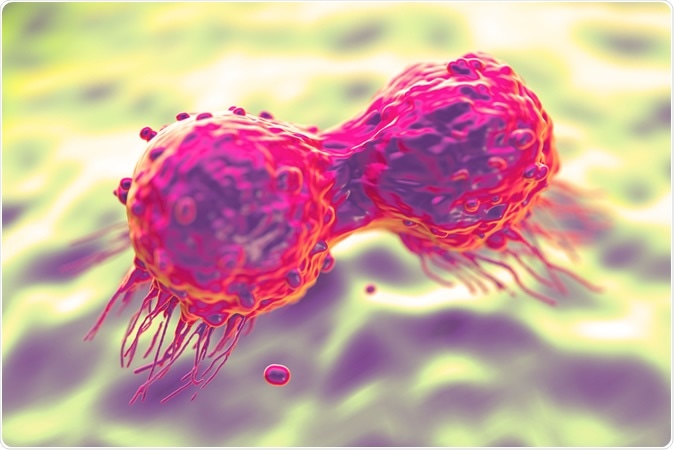Breast cancer is a condition wherein the cells in the breast grow uncontrollably. Breast cancer can spread to the other parts of the body, termed as metastatic breast cancer. It is one of the most aggressive and potentially deadly types of cancer.
A new study by researchers at Vanderbilt University Medical Center shows the importance of genetic testing for all metastatic breast cancer patients, which is considered an essential step to identify additional patients with increased risk and response to targeted therapies.

Dividing breast cancer cell - Illustration Credit: royaltystockphoto.com / Shutterstock
In the study, published in the journal JAMA Oncology, the researchers found that of 100 people diagnosed with metastatic breast cancer, 14 had a genetic mutation associated with the disease and 21 had a variant of unknown significance.
The study provides an important information regarding current drug treatment for metastatic breast cancer. Currently, the poly ADP ribose polymerase (PARP) inhibitor has been approved for patients with HER/ERBB2 negative breast cancer with germline BRCA1 and BRCA2 pathogenic variants.
A germline variant is a mutation or change in a gene, that is acquired from the parents. The term pathogenic means that the mutation is tied to a greater risk of disease, and in this case, breast cancer. The term variant of unknown significance means that a mutation is present inside the gene, however, the researchers couldn’t confirm if the mutation is safe or a risk factor for an illness.
“We found almost twice as many mutations than what we would have found if we adhered to NCCN guidelines, and some of those patients could go on clinical trials that could therapeutically help their disease," Dr. Ben Ho Park, Donna S. Hall Chair in Breast Cancer at Vanderbilt University Medical Center, said in a statement.
Inheriting breast cancer
There are two popular genes that can mutate and boost the risk of breast cancer and ovarian cancer – BRCA1 and BRCA2. Women who inherit the mutation from their parents are at a bigger risk of developing the two cancer types. Men with the gene mutations are also at a higher chance of having breast cancer, and if BRCA2 is altered, they may have prostate cancer.
In all breast cancers, an estimated 5 to 10 percent are considered hereditary or inherited, which means the cancer is associated with germline mutations, acquired from the parent.
People who have family members with breast cancer, including grandmothers, mother, sisters, or aunts, from both sides of the family, have increased risk of developing breast cancer. Also, those who have family relatives with triple-negative breast cancer, those with ovarian and breast cancer cases in both sides of the family, and those with known breast cancer gene mutation in the family.
The results of the study highlight the importance of genetic testing as additional support for patients with metastatic cancer, based on their high prevalence of pathogenic variants.
“Consequently, our results provide evidence to support genetic testing for inherited cancer predisposition among all patients with metastatic breast cancer because this group represents a population with a high prevalence of [pathogenic] variants that could have therapeutic implications,” the researchers wrote in the study.
What is metastatic breast cancer?
Metastatic breast cancer, also known as stage IV breast cancer) is a type that has already spread to other parts of the body, usually to the lungs, bones, brain, and liver. The cancer cells would break away from the original tumor and go to the surrounding tissues, and eventually other parts of the body through the lymphatic or the cardiovascular system.
Breast cancer can relapse in another part of the body months or even years after the first diagnosis and treatment. In fact, approximately 30 percent of women with early-stage breast cancer will have or develop metastatic disease in the future.
Source:
National Cancer Institute. (2019). Study estimates the number of U.S. women living with metastatic breast cancer. https://www.cancer.gov/news-events/press-releases/2017/metastatic-breast-cancer-survival-rates
Journal reference:
Stuttgen, K., Croessmann, S. and Fetting, J. (2019). Pathogenic Germline Variants in Patients With Metastatic Breast Cancer. JAMA Network. https://jamanetwork.com/journals/jamaoncology/article-abstract/2749176?resultClick=1